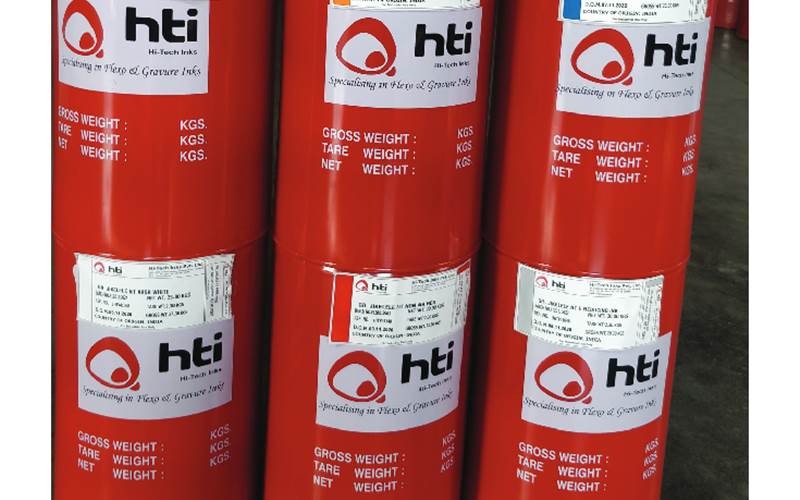Made in India: Jikelele from Hi-Tech Inks
Jikelele, the polyurethane ink system from Hi-Tech Inks, has been designed with all compliances for the Indian as well as international markets in mind, Karan Mahajan, managing director, Hi-Tech Inks tells Rahul Kumar
25 Jan 2021 | By PrintWeek Team
Jikelele from Hi-Tech Inks is a 100% compliant polyurethane-based ink system launched in 2016. The name is from the Afrikaans language, which means universal, and as the name suggests, it is a common ink system that can be used across multiple substrates for all types of lamination.
According to Karan Mahajan, managing director, Hi-Tech Inks, this polyurethane ink system that has been designed keeping in mind all the compliances for the Indian market as well as most of the international regulations. Jikelele is offered in both a non-toluene (NT) system as well as in a non-toluene and non-ketone (NTNK) system.
Hi-Tech Inks is one of the fastest-growing ink companies in the country. It was established in South Africa in 1989, and the India operations started in 2007. The Indian operation, which was started by the parent company in South Africa, was eventually bought out by the Mahajan family in 2015, making Hi-Tech Inks India a 100% Indian-owned and Indian-managed operation. Today, Hi-Tech produces and sells over 12,000 MT of inks per
annum.
For flexible packaging
Jikelele, which has been in the market since 2016, is used for printing in rotogravure printing process. “We are working in the R&D centre to make it suitable for flexo printing as well,” Mahajan says. He adds that the user-friendly inks are aimed at flexible packaging converters of all sizes, and are suitable for all machine speeds.
“The inks are designed to give the best results at an optimum application cost. There is also extensive work done on the pre-press systems to ensure we can assist our customers to get the optimum printing cost. Our state-of-the-art production facility with GMP-based production capacity, coupled with an extensive pan-India distribution network ensures on-time delivery to all regions,” Mahajan explains.
He said for a product like printing ink, it should be compliant with the local and international laws. Also, the product should offer performance and consistency to fulfil the functional requirements at an optimum
application cost.
Jikelele is mainly to be used for reverse printing and lamination. It can be used across a variety of substrates and all types of lamination (wet, dry and extrusion). This ink system can handle all types of laminate, including retort (boil in bag), juice packaging (hot-filling), etc. “I would say, the most extraordinary application done using Jikelele so far is in-mould labels,” he says.
The USP
As for the USP of the ink system, Mahajan says, it offers non-toluene inks for food packaging application, which are designed for giving exceptional press performance at an optimum application cost per square metre.
The components in the ink include resins, pigments, carrier solvents and performance additives.
“These inks are designed to perform at machine speed ranging from 30 to 500-mpm, thus allowing the converter to get 100% machine speed utilisation,” Mahajan says, adding, “These are designed as per the new BIS guidelines for food packaging. In addition, it enables printing at high speed, something the earlier generation of products struggled to achieve.”
Also, Mahajan says, these are user-friendly inks. “In consultation with our tech service team, any usage becomes even easier,” he adds.
The company offers regular interactions and training sessions conducted by its tech service teams on various aspects of printing, including troubleshooting. “In addition, we offer an array of value-added services focussed towards ink management services,” Mahajan adds.
The company also has region-wise stock points and dedicated technical service teams for all aspects of converting, including cylinder specifications, overall print performance, lamination, re-usage of press return inks, etc.
Mahajan gives an example of how customers are leveraging these benefits. “A customer who was using conventional toluene-based vinyl inks saw a net savings of 6-8% in the cost of printing after switching to Jikelele NT inks, in spite of moving to a compliant ink system. Per kg ink cost is definitely 15-20% higher, but there have been savings on multiple different aspects which has resulted in the net savings of 6-8% compared to the conventional system,” he says.
Best practices
Mahajan’s suggestion to the best practices on an Indian shopfloor is to follow the GMP. “You need to ensure that all safety norms and precautions are being followed. Keep the shopfloor clean and make sure that enough space is available for free movement. Timely consumption of press return inks is a key aspect to ensure safety and reducing losses. One more important aspect to keep in mind is the right way to maintain work-in-progress material on the shopfloor. Customers should always ensure that laminated rolls are kept hanging and not on the floor and also that an adequate size hot room is available (especially during cold seasons) for curing of laminated materials,” he explains.
About the recent trends in the packaging-printing industry, Mahajan says sustainability is the buzzword, and monolayer and monopolymer-based packaging is the need of the hour. “Apart from this, with toluene being banned in the near future, there will be a huge shift in the ink systems used by majority of the converters for which the ink industry needs to be well prepared. This would involve a lot of training, both in-house and at the customer’s end,” he adds.
He says if the toluene ban is successful, then the company is extremely bullish on the Jikelele product line, along with the other NT and NTNK products it offers. “It’s difficult to put a number or percentage to it at this stage, but we are foreseeing substantial volumes moving forward and thus have already prepared the back-end support for the same,” he concludes.












 See All
See All